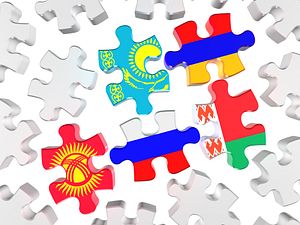The edifices of the Eurasian Economic Union (EEU), the Moscow-led organization acting as a nominal counterweight to the European Union, crumbled long ago, bucked by economic realities and the Kremlin’s insistence that the organization act as a front for its neo-imperialist policies. In the 16 months since the group came online, any fortunes the EEU may have boasted have only continued to falter. The EEU may not be quite the empty-shell organization we can observe in, say, the Commonwealth of Independent States, but it’s only continued lurching in that direction.
New numbers only confirm the organization’s inability to offer more than high-level meetings and muddled customs regulations. According to Forbes Kazakhstan, Kazakhstan has announced that its total trade turnover with other EEU states has collapsed some 34.1 percent since early 2015, year-on-year, dropping to $1.61 billion dollars. Trend added that Kazakhstan’s exports to EEU nations since the organization was inaugurated have dropped some 24 percent, while imports have plummeted nearly 40 percent. For an organization tasked with easing post-Soviet economic integration, the numbers paint a harrowing push in the opposite direction.
Beyond the trade collapse, though, hangs another issue that continues to fester. Over the past month, The Diplomat’s Catherine Putz has detailed the rising friction between Armenia and Kazakhstan, two of the EEU’s five members. As it is, the troubles between Yerevan and Astana – at least as it pertains to the EEU – stretch back to 2014, when Kazakhstan publicly pushed back against the accession of Nagorno-Karabakh, the disputed region within Azerbaijan’s borders. At the time, Kazakhstan President Nursultan Nazarbayev declaimed that states could only join the EEU via their UN-recognized borders. While piqued, Armenia eventually acquiesced, to the consternation of officials in Nagorno-Karabakh.
But like all issues surrounding Nagorno-Karabakh, the issue lay dormant for only so long. Earlier this month, the region saw its worst fighting in decades, with a ceasefire now holding only tenuously. In the fallout, Kazakhstan voiced another complaint – this time, that the April EEU summit was supposed to be held in Armenia. As such, the meeting was relocated to Moscow. Wrote Putz, “The decision to cancel the Yerevan meeting and replace it with a gathering in Moscow is sure to be further ammunition for the Union’s critics.”
If anything, the frustrations between Kazakhstan and Armenia – who are also security allies, via the Collective Security Treaty Organization (CSTO) – have only swelled since. Firstly, a business delegation from Kazakhstan canceled its planned participation in an Armenian investment forum. As the chairman of the Union of Manufacturers and Businessmen of Armenia pointedly told News.am, “[T]hey are citizens of a totalitarian country. Even the first words of command from above are enough for them to refuse the invitation. They explained that they had to refuse to take part in the forum due to security considerations – not personal, but regional.”
Secondly, according to RFE/RL, the Armenian village of Harich announced that it would be removing Nazarbayev’s name from one of the town’s main streets, and had “dismantled ‘Kazakhstan’s corner’ at the village library, a collection of Nazarbayev’s portraits and books about Kazakhstan.” As the mayor added, “Nazarbayev was supposed to be our friend, but he is now saying that ‘the Armenians are killing our brothers.’… So if the Azerbaijanis are their brothers then the Armenians must be their enemies. That is why the street [named after Nazarbayev] doesn’t exist anymore.”
Armenia’s concerns, apparently, continue to center on Kazakhstan’s purported support for Baku in the Nagorno-Karabakh situation. And the concerns aren’t exactly without merit. Not only was Kazakhstan potentially a party to an Organization of Islamic Cooperation statement tabbing Armenia as the “aggressor,” but, at the end of March, Nazarbayev released a “manifesto” calling for the elimination of “military blocs” – which would include, presumably, the CSTO. As Nazarbayev wrote, “We have also seen attempts by some states to use the protection of military blocs to their advantage in their interactions with third countries, including immediate neighbors.” While Russia, in light of its actions in Ukraine, could fit Nazarbayev’s description, so too could Armenia.
Like the Eurasian Union’s broader issues, tensions between Armenia and Kazakhstan show no signs of slowing anytime soon, especially now that the extension of Nazarbayev’s cult of personality to other post-Soviet countries is no longer safe. Thankfully, the Kazakhstani president can still fall back on a statue in Ankara and streets in Russia and Jordan – for the time being, at least.

































